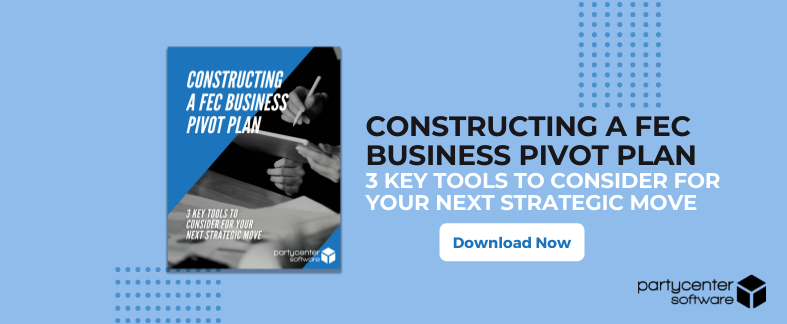Whether you're the owner of a bustling arcade, a lively family fun center, or an electrifying theme park, understanding and optimizing your tax situation is more than just a back-office chore—it’s a core component of your business strategy.
In this comprehensive guide, tailored specifically for the vibrant world of entertainment centers, you'll learn how to keep more of your earnings within your business. From demystifying tax compliance to clever strategies for tax optimization, we're here to ensure you're well-versed in each act.
The Ultimate Guide to Navigating FEC Taxes: Tips and Strategies for Entertainment Centers
Act 1: Understanding the Tax Landscape for Entertainment Centers
For an entertainment center, the tax landscape is as complex and diverse as the attractions it houses. You're not just contending with federal taxes dictated by the Internal Revenue Service (IRS), but also levies at the state level that can vary significantly from one location to another. Local taxes further add to the mix, sometimes differing across city or county lines.
FEC Taxes of the Trade: What You Need to Know
Entertainment centers typically face a blend of tax types, including income taxes, sales taxes, and, most frequently, amusement taxes. Each carries its nuances and intricacies specific to the FEC industry, such as the challenge of properly categorizing income between admissions, concessions, merchandise sales, and more.
Deductions and Credits that Entertain: Navigating the Tax Saving Mechanisms
Understanding the deductions and credits available to your enterprise can significantly reduce your tax burden. These can include everything from depreciation on attraction equipment to the Work Opportunity Tax Credit (WOTC) for hiring employees from certain groups.
Act 2: Navigating Tax Compliance with Precision
The Playbook for Accurate Tax Filing
Accuracy is paramount when it comes to tax compliance. Mishaps in reporting can lead to penalties, which no business aims to include in their ledgers. Therefore, it's crucial to institute a meticulous system for tracking and categorizing all relevant financial transactions throughout the year.
Record-keeping 101: The Foundation of Tax Compliance
Solid tax compliance begins with organized record-keeping. This involves maintaining detailed transaction records, storing receipts for all expenses, and documenting the cash flow of your FEC operations. A cloud-based accounting software can be your best friend in staying on top of these tasks.

Deadline Awareness and the Art of Preparation
With multiple tax obligations (e.g., quarterly sales tax filings), staying ahead of deadlines is non-negotiable. Prepare well in advance of due dates, ensuring sufficient time for both preliminary and detailed review by either an internal team or external financial advisors.
Act 3: Strategies for Tax Optimization and Maximization
The Tax Minimization Show Must Go On
No entertainment center owner enjoys paying more taxes than necessary. Luckily, there are myriad strategies available specifically for FECs to legitimately lower their tax bills.
Strategic Planning for Financial Performances
Engaging in year-round financial planning is akin to writing a blockbuster script—the early drafts (or quarters) lay the foundation for the finale. This involves examining your FEC's financial strategies, seeking out opportunities for tax-exempt investments or savings, and understanding the implications of various financial decisions on your tax liabilities.
Leveraging Technology for Smart Tax Management
In this digital age, technology isn't just for the fun and games in your FEC—it's also a powerful ally in managing your tax responsibilities. Investing in tax management software can streamline the process, providing reports, and analyses that offer insights and opportunities for optimization.
Act 4: Keeping Up with the Ever-Evolving Tax Laws for FECs
A Taxing Twist in the Tale: Staying Informed
Tax laws are rarely static; they evolve and change over time, sometimes dramatically so. Keeping abreast of these changes is vital to avoiding unexpected tax spikes or, conversely, missing out on new benefits and incentives.
Recent Tax Law Overhauls and How They Affect FECs
Recent tax laws, such as the Tax Cuts and Jobs Act (TCJA), have introduced sweeping changes that directly impact FECs. Staying informed on alterations to deductions, credits, and even tax rates is essential, as is understanding any new compliance requirements.
Adapting to Change Without Missing a Beat
Being proactive in adjusting your FEC's tax strategy is the key to adapting to new tax laws. It involves reaching out to tax advisors, attending industry education sessions, and maintaining open channels of communication with other FEC owners to share insights and best practices.

Act 5: Key Resources and Tools for FEC Owners
The Treasure Chest of Tools at Your Disposal
Thankfully, in the treasure trove of tax resources available, there are plenty designed specifically for FECs to make the tax-filing process easier, more accurate, and more advantageous.
Tax Management Software: The Swiss Army Knife of Tax Analysis
High-quality tax management software can provide a comprehensive overview of your FEC's tax obligations and potential savings. It can also help you forecast how different decisions might impact your tax liabilities, offering a dynamic tool for strategic planning.
Consulting Services and Industry Knowledge: Valuable Assets for FECs
In this somewhat niche but critical area, professional tax consultants that specialize in the FEC sector are worth their weight in gold tokens. They bring not only expert knowledge of tax law but also an intimate understanding of the unique challenges and opportunities present in the FEC industry.
Act 6: Case Studies and Success Stories
Learning from the Limelight
Sometimes the best guide is a real-life example. We'll paint a picture with real-world FEC success stories, detailing how strategic tax planning and compliance led to triumph for other entertainment centers just like yours.
Success Through Strategic Financial Planning
Follow the stories of FECs that synchronized their financial planning with tax optimization, resulting in increased profits and opportunities for expansion. These case studies will provide you with actionable insights and inspiration for your own FEC's tax strategy.
Act 7: Bringing It All Together
The Grande Finale
The curtain falls, and we reach the end of this comprehensive guide. You've now walked the path from understanding the peculiarity of FEC taxes to optimizing your financial health through expert management and strategic maneuvers.
The Encore to Your FEC's Tax Strategy
Like any great show, the art of tax management doesn’t end here. The ongoing success of your entertainment center depends on keeping this area of your business primed and polished. Whether it's reflecting on the deep dives of this guide, engaging professional services, or leveraging technology, remember that the show can—and should—keep beating last year's numbers.
We hope this guide sets your entertainment center on the path to fiscal stardom. Remember, taxes are not the antagonist in your FEC’s story; they are a supporting character that, when managed effectively, can catapult your business to on-going success.